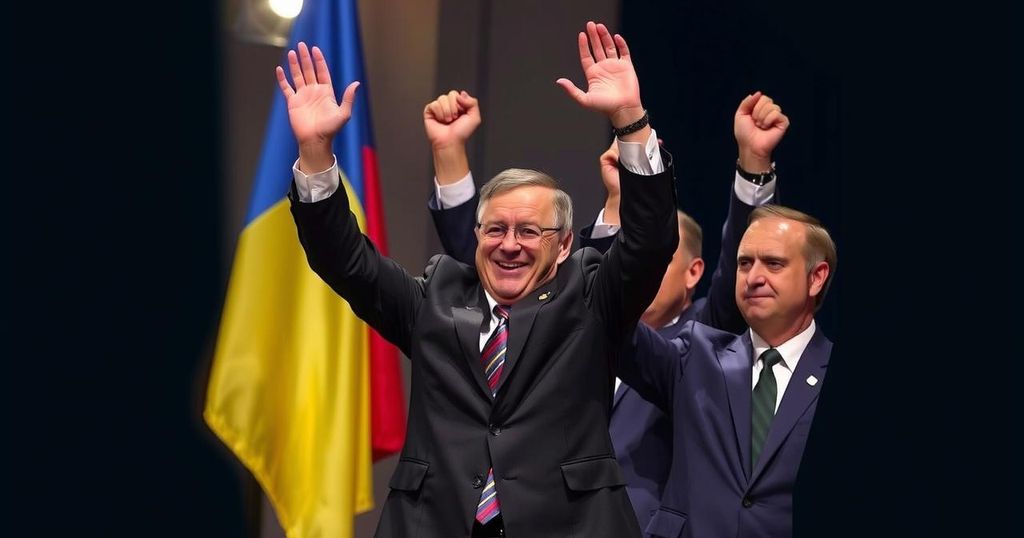Moldova’s Pro-Western President Wins a Crucial Second Term Amid Allegations of Russian Interference

President Maia Sandu has won reelection in Moldova’s runoff, receiving 55% of the vote against pro-Russian candidate Alexandr Stoianoglo. The election was marred by claims of Russian interference, voter fraud, and intimidation. Sandu emphasized the democratic significance of the vote while investigations into electoral malpractice are ongoing amidst Moldova’s aspirations for closer ties with the EU.
In the recent pivotal runoff election in Moldova, President Maia Sandu, a staunch advocate of pro-Western policies, has secured a second term against rival Alexandr Stoianoglo, who favors closer ties with Russia. As of the near-complete count of votes, Sandu garnered approximately 55% of the ballots, compared to Stoianoglo’s 45%. This election was marred by serious allegations of Russian interference, voter intimidation, and fraud, raising significant concerns about the integrity of the democratic process in Moldova. Upon confirming her victory, President Sandu addressed her supporters, affirming that “today, dear Moldovans, you have given a lesson in democracy, worthy of being written in history books. Today, you have saved Moldova!” She highlighted the alleged external manipulations and noted that various schemes, which included vote-buying and the involvement of criminal entities, were intended to undermine the electoral process. Conversely, Stoianoglo expressed a desire for unity post-elections, advocating for an end to societal divisions. Voter turnout was reported at approximately 54%, with significant participation from Moldova’s diaspora, where many voted in favor of Sandu. The election came at a critical juncture, as Moldova aspires for closer integration with the European Union amidst geopolitical tensions with Russia. Moldovan law enforcement agencies have initiated investigations into several allegations related to voter manipulation and intimidation tactics aimed at influencing the election outcome. Reports include organized transportation of voters, outwardly orchestrated bombing threats at polling locations in foreign countries, and cyber-attacks purportedly aimed at disrupting electoral systems. Among the unsettling claims is a coordinated scheme involving a convicted oligarch residing in Russia, allegedly aiming to exert undue influence over the elections. These elections reflect broader regional dynamics, as they illustrate Moldova’s precarious position between Western aspirations and Russian interests in the wake of the ongoing conflict in Ukraine. As Moldova continues its journey toward EU membership, the integrity of its electoral processes remains a central issue that must be addressed moving forward.
The election for the presidency in Moldova has far-reaching implications due to the country’s aspirations to join the European Union, particularly following its application for candidate status in June 2022 post-Russia’s invasion of Ukraine. Historically positioned between pro-Western and pro-Russian influences, Moldova’s political landscape is fraught with tensions that reflect larger regional geopolitical struggles. The incumbent pro-Western government, led by Maia Sandu since 2021, aims to forge closer ties with the EU, while opposition factions, including those aligned with Russia, seek to maintain Moldova’s ties to its former Soviet affiliation. The current election was not only a test of democratic integrity but also an indicator of the prevailing political currents in Moldova and their potential impact on future legislative elections.
In conclusion, the re-election of President Maia Sandu marks a significant victory for Moldova’s pro-Western agenda, albeit under the looming specter of alleged electoral interferences, including accusations of Russian meddling. It underscores the necessity for continued vigilance in safeguarding the democratic processes in Moldova as it navigates its future in relation to both the European Union and Russia. The allegations of voter fraud and other manipulative tactics serve as a pressing call to action for the Moldovan authorities to reinforce their electoral integrity ahead of the upcoming legislative elections in 2025.
Original Source: www.cnn.com








